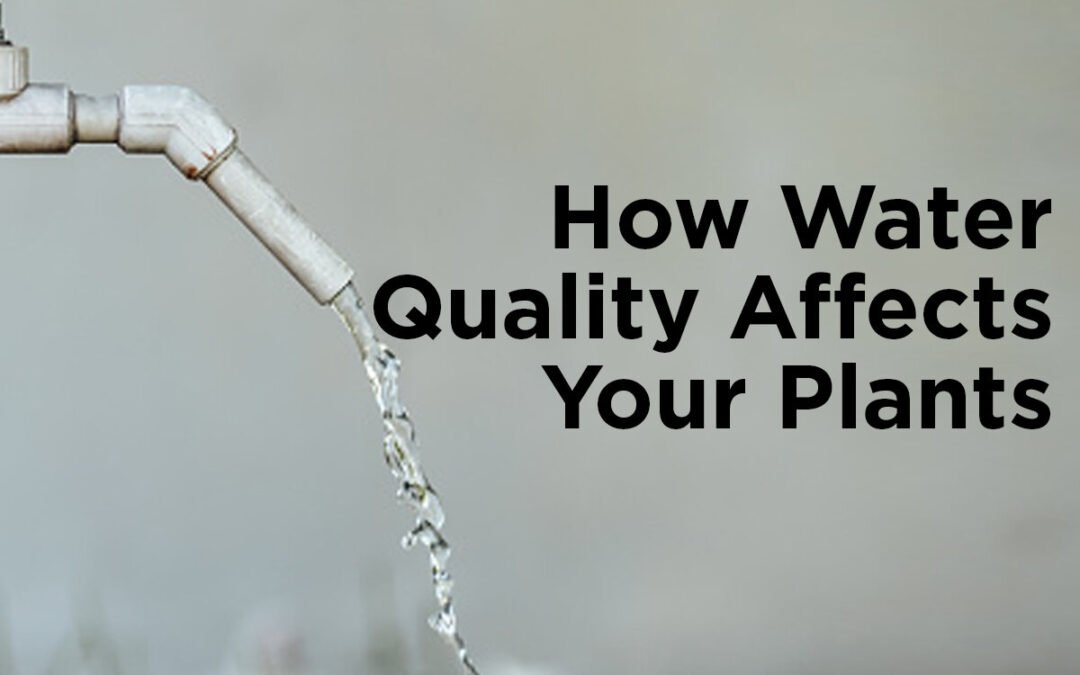Mostly all plant parents already know all houseplants require a sufficient amount of water but it is crucial to know what quality of water is ideal to stay plants healthy and energetic because it has very deep effects on the health of houseplants. It is not just important to know about the frequency of water but the quality of the water itself. Let’s discuss what type of water is perfect for houseplants.
Types of water for indoor Plant
- Tap Water
- Hard Water
- Soft Water
- Distilled Water
- Filtered Water
- Bottled water
- Rainwater
- Aquarium Water
- River or pond water
Tap Water
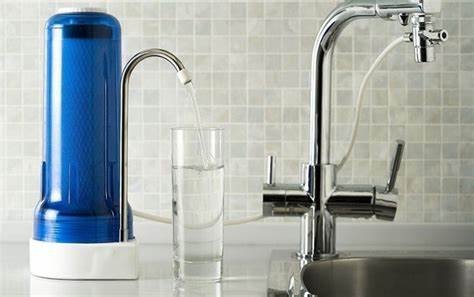
A colossal number of people feel comfortable using tap water for houseplants because it is easily available all the time when we need it. The quality of tap water depends on your residential area. Tap water can be divided into two categories hard water and soft water depending on minerals. Tap water contains
- Chlorine
- Fluoride
- Heavy Metals
- High sodium level
Palms, spider plants, dracaenas, and Calathea are pickier to fluoride so, be careful about these plants.
Hard Water
Hard water includes calcium, magnesium, carbonates, bicarbonates, and sulfites. Calcium and magnesium salts can accumulate in the soil as a result of watering the plants with hard water. High alkalinity in hard water can kill a few plant species. If you water your green friend with hard water, it’s very important to flush out the salty soil every 2-3 months through rainwater, filtered, or distilled water. If you notice brown spots on the surface of the leaves then stop using hard water.
Soft Water
Soft water contains potassium chloride and sodium ions. Watering your plant with soft water is very unhealthy and toxic because it completely builds up sodium ions on the surface of the soil.
Pros of Tab Water
- Using tap water for houseplants is a very cheap and accessible way for consumers.
- The standard of water quality is set in different places or in people’s minds.
- It has lower environmental effects.
Cons of Tab Water
- White crusty show on the top surface of the soil or all around the pot
- Glossy green leaves convert into brown or yellow leaves
- Tap water cause droopy plant
- Soft water creates sodic soil which is dangerous for the health of houseplants.
Distilled Water
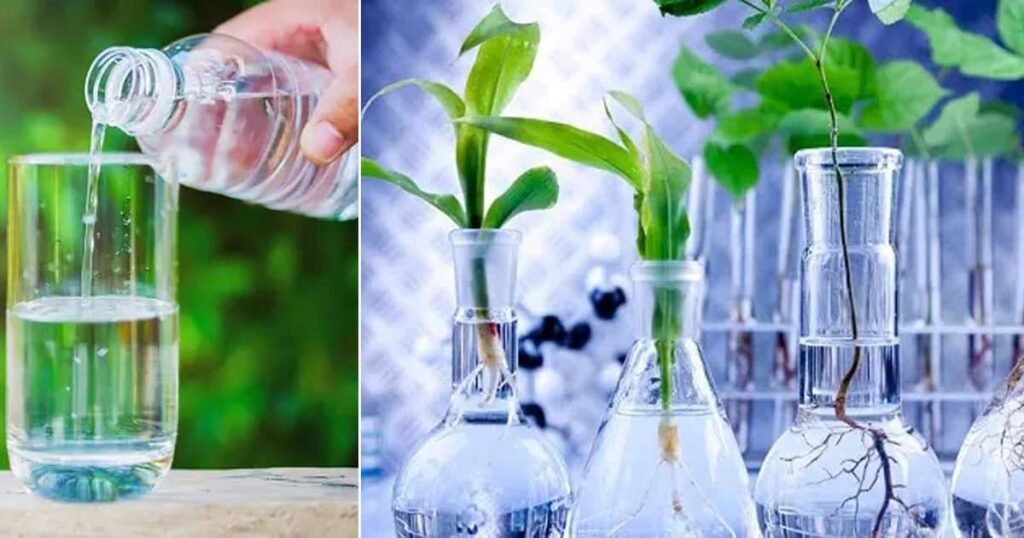
Distilled water is extremely purified water that is completely free of all contaminants and impurities Water is heated until it turns into steam which is then condensed back into a liquid and collected in a new container. It is good for all houseplants although it can be expensive for you.
Pros of Distilled Water
- Distilled Water is free from all minerals such as calcium, magnesium, and sodium.
- It has no bad effect on the growth of houseplants.
Cons of Distilled Water
- If you can’t get it just turn on the faucet. Just have to go out and purchase it from the shop.
- It demands high cost due to the distillation process
Rainwater
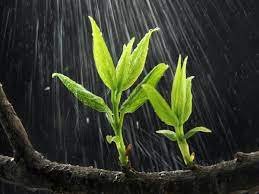
Rainwater is a very beneficial and natural source for all houseplants and crops because it is natural and chemical-free such as Chlorine and fluoride. Nature wants to drink the plants with pure water. Rainwater.
Pros of Rainwater
- Rainwater contains a huge amount of oxygen which is perfect for the proper growth of plants.
- Rainwater is rich in nutrients.
- It contains a low amount of calcium and magnesium.
Cons of Rainwater
- Rainwater is naturally acidic but if you live in a manufacturing area then rainwater may be highly acidic due to pollution.
Filtered Water

If you have no option except tap water then filtered water is the best type of water for indoor plants. Filtered water is free from salt and suitable for cacti, succulents, and tropical plants. There are many varieties of filters as faucet attachments available in the market.
Pros of Filtered Water for indoor plants
- Filtered water can eradicate chlorine, bacteria, fluoride, and heavy metals from tap water.
- It is good for your family and your green friends.
Cons of Filtered Water
- It needs a lot of space.
- It may be expensive compared to other methods of watering.
- It is no option for you except change the filter every couple of months
Bottled Water

Bottled water is another best source of watering your houseplants. It is known as spring water or mineral water. Bottled water shows the same results as filtered tap water but we will always recommend filtered water as compared to bottled water.
Pros of Bottled Water
- Bottled water consists of minerals such as magnesium and calcium that are beneficial for houseplants.
- Bottled water doesn’t contain chlorine and fluoride.
Cons of Bottled Water
- The expense of bottled water can increase rapidly if you have a colossal number of houseplants
- Bottled water has a high environmental impact
- Plastic Containers require to be recycled after some time.
Aquarium Water
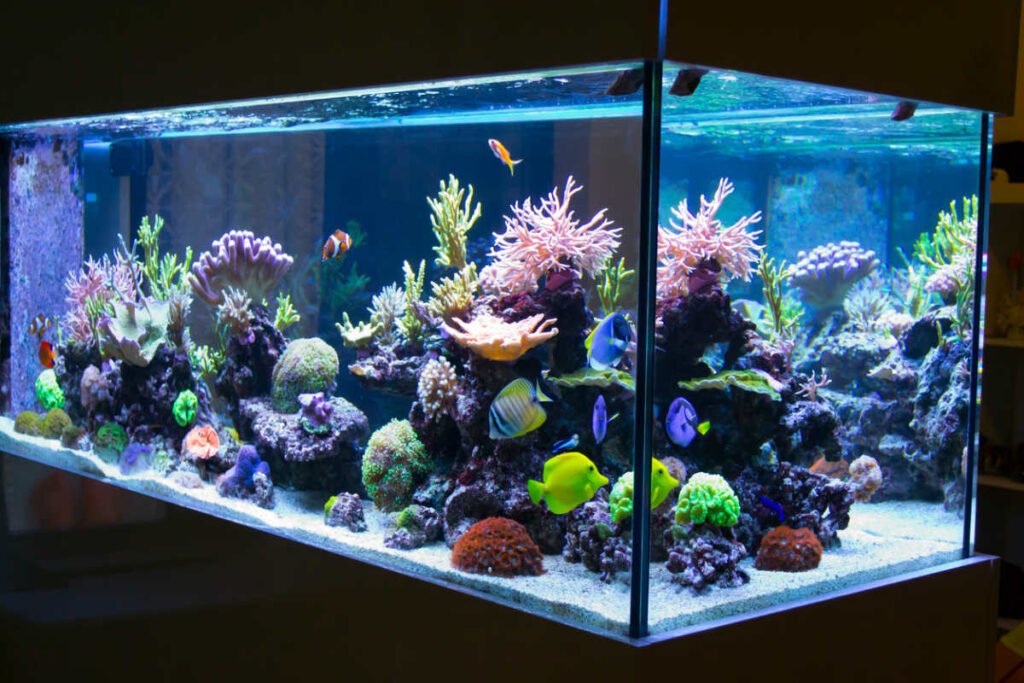
If you are an aquarist (fish lover), have a fish tank in your home, and always forget to clean the fish tank, you can utilize this dirty aquarium water after diluting it to water your green indoor plants.it is an ideal source to fertilize your plants. Always using aquarium water for houseplants and ornamental plants is not the best choice but acceptable option if you can’t afford the cost of filtered or distilled water.
Pros of Aquarium water for houseplants
- Aquarium water contains potassium, phosphorous, nitrogen, nutrients, and useful bacteria that are most important for the proper growth of plants and stay houseplants happy.
- When your fish exit their waste in the tank, it divides into ammonia and nitrate ultimately which boost up growth and development of houseplants.
Cons of Aquarium Water
- If you notice any terrible disease in fish, don’t use aquarium water to water your green friends because it can damage the growth of houseplants.
- Aquarium water can only perform best for the growth of plants when you store it for a long period before watering your indoor plants.
Stream, pond, or River Water
If you have no option except river or pond water, it could be permissible for you. But don’t forget to test this river water before watering your indoor plants because it contains an abundance of heavy metals and pollutants.
Pros of river or pond water
- If you live nearby mountain areas, you can use river water in this case because it contains nutrients and minerals.
Cons of river or pond water
- River water can be perilous to your houseplants because it may consist of harmful chemical and industrial waste materials that can stop the growth of houseplants.
- Don’t apply it to your sensitive indoor plants such as spider plants.
Carbonated or Sparkling water
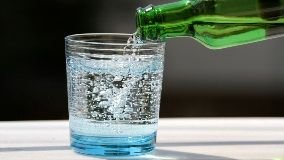
Carbonated water is also known as seltzer water or sparkling water. It provides essential elements such as hydrogen, carbon dioxide, and oxygen for plants. You can drip it gently in the soil or around the base of the plant, it will assist and encourage your plants to take benefits of nutrients and CO2.
Pros of Carbonated water for plants
- Carbonated water is rich in plant nutrients such as calcium, magnesium, potassium, sodium, and phosphorous.
- The ability of plants to store more water can increase in the presence of a huge amount of CO2.
Cons of Carbonated Water
- If you use flavored carbonated water which contains salt or sugar, it will welcome all pests like ants to seize the roots and encourage fungal infection and diseases.

